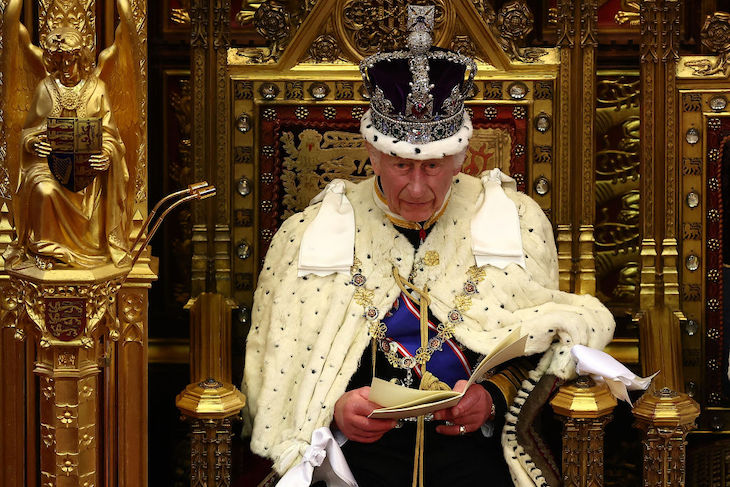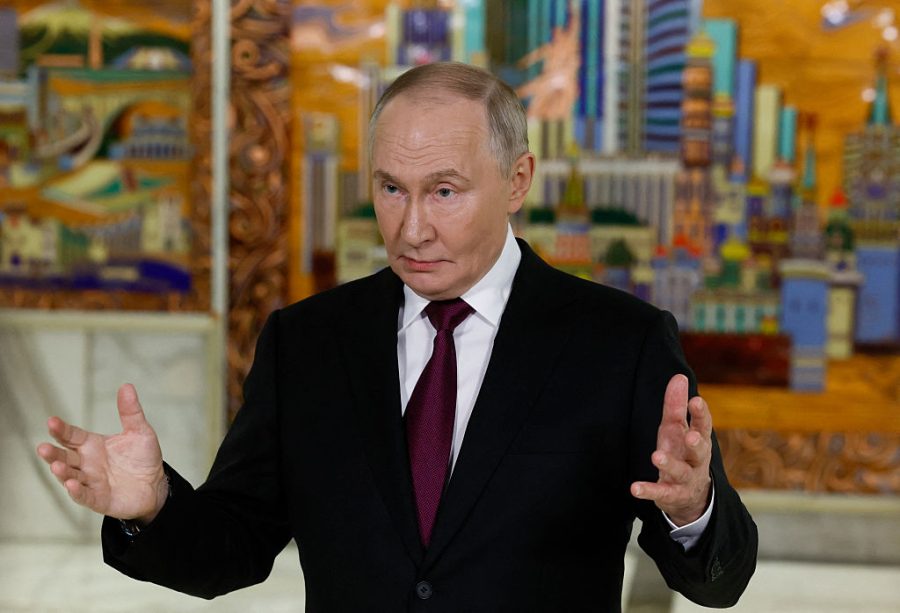The big theme of today’s King’s Speech is ‘mission-led’ government, with economic growth, house building, workers’ rights and devolution the key elements. King Charles told the House of Lords that ‘taken together these policies will enhance Britain’s position as a leading industrial nation and enable the country to take advantage of new opportunities that can promote growth and wealth creation’. There are six bills designed to deliver these plans.
One of the things about a King’s Speech is that what follows in the parliamentary session often bears little resemblance to what the monarch has said
The Budget Responsibility Bill will force every fiscal event to be subject to an independent assessment from the Office for Budget Responsibility. The briefing on this piece of legislation is strikingly political: it says: ‘This Bill delivers on the manifesto commitment to introduce a fiscal lock’ – to ensure that the mistakes of Liz Truss’ ‘mini budget’ cannot be repeated’. The new Labour government is taking every opportunity to bake in a narrative about the Conservatives blowing up the economy and breaking everything, just as the Tories did back in 2010 when they came into government.
There are also two regulatory reform bills: a draft audit reform and corporate governance bill, which will ‘revamp’ the current Financial Reporting Council, replacing it with an Audit, Reporting and Governance Authority. The Pensions Schemes Bill will also boost the Pensions Ombudsman and change a number of rules around pensions.
On house building, the Planning and Infrastructure Bill, which will probably be the source of many of the big political rows over the next parliamentary session, will ‘accelerate house building and infrastructure delivery’ and make the planning system ‘an enabler of growth’.
The main thrust of this piece of legislation is to speed up the planning decisions for major infrastructure and house building. It has a section on ‘using development to fund nature recovery where currently both are stalled’, including working with ‘nature delivery organisations, stakeholders and the sector over the summer to determine the best way forward’. Along with a presumption in favour of development on ‘grey belt’ or brownfield sites first, this emphasis on nature recovery, while important, will also be the likely cause of the most disputes inside and outside parliament.
Workers’ rights is something Deputy Prime Minister Angela Rayner has set particular store by, and has also been a source of strife between the Labour party and the trade unions over how far the government wants to go. The emphasis in this legislation is on ‘partnership’ – between business, trade unions and workers. This will include a ban on ‘exploitative’ zero-hours contracts (rather than an outright ban on all such arrangements), banning ‘fire and rehire’, making entitlements such as parental leave, sick pay and protection from unfair dismissal available from day one of a new job, and ‘updating trade union legislation’. The latter of these is something the trade unions have been pushing for, including scrapping the Minimum Service Levels legislation introduced by the Conservatives.
Devolution has been promised by many incoming governments over the past few decades, and to a certain extent the English Devolution Bill is a continuation of the work that George Osborne did when chancellor. This new legislation promises to address the ‘inconsistent, deal-based and patchwork approach’ to devolution, including allowing local leaders to formally request more powers, creating more mayors and giving communities a ‘right to buy’ for community assets such as empty shops, pubs and community spaces.
There are other significant pieces of legislation beyond these first six bills announced by the King. Transport features heavily. The Passenger Railway Services (Public Ownership) Bill will make the appointment of a public sector train operator the default rather than a last resort. A separate Railways Bill will bring passenger services and the management of the network into a single body called Great British Railways. This new organisation will also reform the ticketing system. There is also a Better Buses Bill, which gives new powers to local leaders to franchise bus services, and lifts the restriction on the creation of new publicly owned bus operators.
A Hillsborough Law aims to tackle defensiveness in the public sector, placing a legal duty of candour on public servants and authorities, and providing legal aid for victims of disasters or state-related death. It is staggering how long this inequality of arms has been clear and how many disasters have taken place since.
There are a number of reforms that the Conservatives didn’t manage to get done. The Tobacco and Vapes Bill is one of the things Rishi Sunak named among his proudest achievements, but he called an election before he saw it on the statute books. The Tories repeatedly tried to reform the private rented sector, but always struggled to do so fully. The Renters’ Rights Bill promises to ‘take action where the previous government has failed’, including on abolishing section 21 ‘no fault’ evictions’, applying a Decent Homes Standard to the sector, and strengthening councils’ enforcement powers against rogue landlords. There will also be draft legislation on leasehold reform. The Mental Health Act is finally being overhauled, after years of unfulfilled promises that the 1983 legislation will be updated. Campaigners have been pushing for this change ever since recommendations were made back 2017, but no government since then has had the bandwidth to do anything about it.
Speaking of no bandwidth, if this new government with a huge majority doesn’t have the space to reform adult social care, when will the conditions ever be better? Aside from fair pay for the workers in this sector, there is no mention of social care in this speech or the accompanying notes. So far, all we have is a report that Health Secretary Wes Streeting might go for cross-party talks to find a solution to the ongoing crisis in care – as though no one has tried that before. Mind you, one of the things about a King’s Speech is that what then follows in the parliamentary session often bears little resemblance to what the monarch has said. Even if we come to the next speech with a better idea of what on earth ‘mission-led government’ actually looks like, it will probably be as a result of events and rows that no one predicted today.








Comments